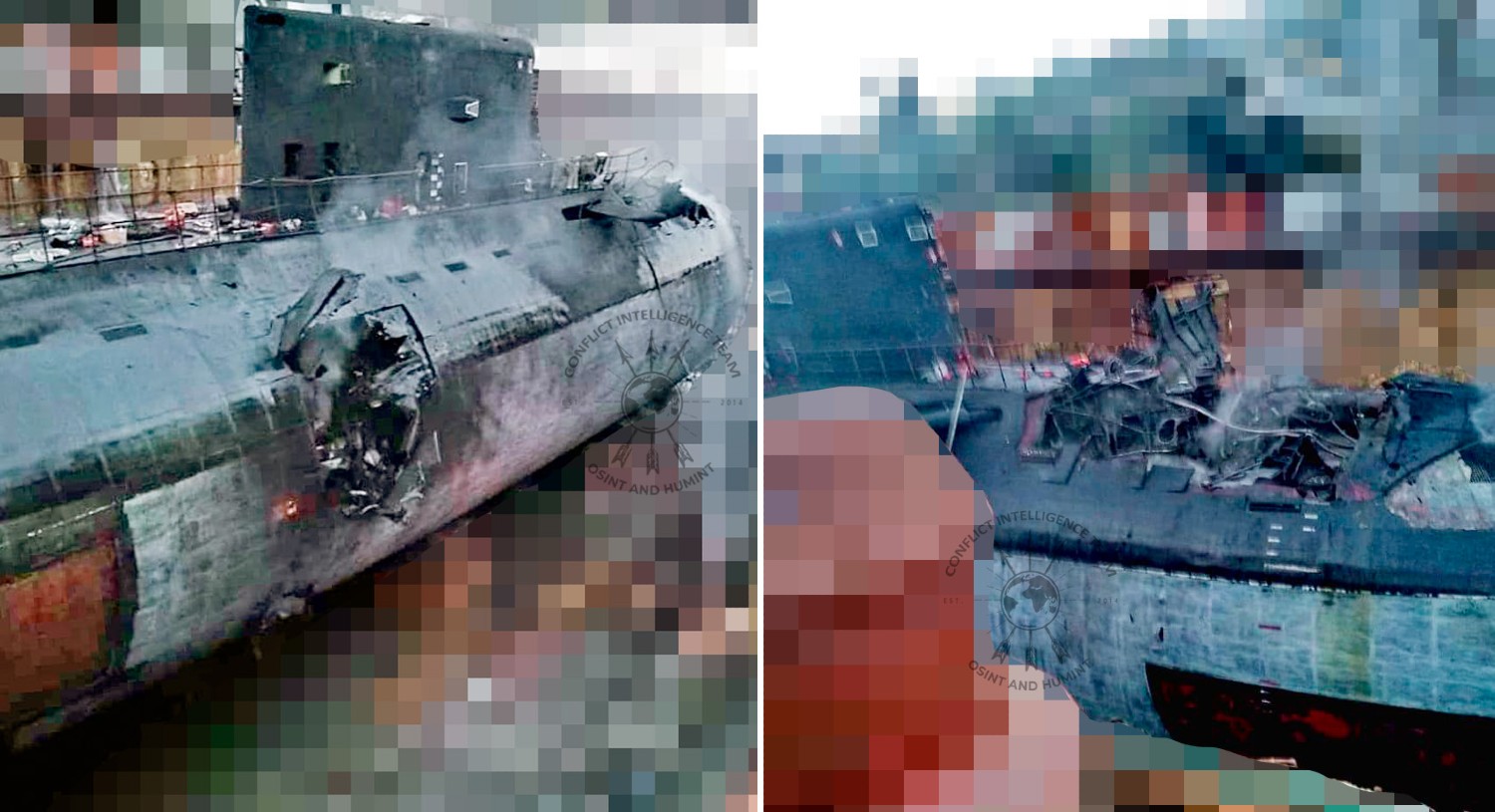Russian Kilo-Class Submarine, ‘Irreparably Damaged’ By Ukrainian Missile Strike, Repaired – State Media
Defying all expectations after it sustained ‘irreparable damage’ from the September 2023 Ukrainian missile attack, a Russian Kilo-class submarine is poised to make a dramatic recovery.

Citing sources in the military-industrial complex, Russian state news agency TASS reported that the submarine “Rostov-on-Don” of project 636.3 of the Black Sea Fleet (Black Sea Fleet) has completed dock repairs.
“Some time ago, the submarine successfully left the dock, its repair continues afloat,” the source was quoted as saying. This publication could not verify the claims independently.
The Rostov-on-Don is an improved Kilo-class submarine that can launch Kalibr land attack cruise missiles. It was one of four of its kind in the Black Sea Fleet and went into service in 2014.
On September 13 last year, Ukraine’s missile attack on a Russian naval facility in Crimea damaged two Russian warships, including the Rostov-on-Don. In the aftermath of the attack, Ukraine’s forces acknowledged that the attack was carried out using the long-range Storm Shadow missile.
Military analysts noted that the Storm Shadow missile likely hit the Russian submarine in the “follow through bomb mode,” as hinted by the impact.
It was the first attack that damaged a Russian submarine and the worst against any Russian vessel since the sinking of cruiser Moskva in 2022. Soon after the strike, preliminary satellite footage showed severe damage to the submarine, with both vessels appearing partially ablaze.
As details about the attack began to surface, the independent investigative group Conflict Intelligence Team (CIT) released a series of images that revealed extensive exterior damage to the submarine. The CIT team posting images on Platform X (previously Twitter) mentioned that the submarine had received two hits, one of which was not visible in the satellite images.
On first examination, the photos showed a sizable hole in the bow that appeared to have been caused by a direct hit. Military observers reported seeing serious damage at the back of the ship close to the propulsion space and even the hull. Many speculated that serious damage might have also been done to the submarine’s interior components.
An unnamed expert told EurAsian Times that “it was obvious that the hole would have caused the inside of the submarine to flood, damaging the sensitive equipment inside the vessel.”
Several military analysts noted that it was highly likely that the submarine would be completely written off because it was damaged beyond repair. Some even predicted that, in the best-case scenario, it would be repaired with salvageable components, necessitating years of decommissioning.
The Russian Ministry of Defense (MoD) did not acknowledge these allegations. In January this year, TASS quoted a source saying the repairs of the damaged Rostov-on-Don diesel-electric submarine of project 636.3 of the Black Sea fleet were planned to be concluded in June 2024.
“The Sevastopol Shipyard (affiliate of Zvyozdochka Shipyard) will complete the repairs of the Rostov-on-Don and eliminate the damage inflicted on September 13, 2023, by a Ukrainian cruise missile strike at the enterprise by the end of the first half of the year,” the source had reportedly said.
The Russian MoD is yet to officially acknowledge the claims regarding the completion of repair work on the submarine crippled by Ukraine.
Sevastopol, the capital of Crimea, has been the target of several missile attacks by Ukrainian forces because it supports Russia’s Black Sea fleet, which is based there. Reports of the damaged Russian submarine’s return coincide with Ukraine’s celebration of the final Russian warship to be withdrawn from Crimea.
Russian Warships Withdrawn From Crimea?
A Ukrainian official has stated that Russia has removed the last warship from its Black Sea Fleet from Crimea. Dmitry Pletenchuk, a spokesman for the Naval Forces of the Armed Forces of Ukraine, announced this on July 15 in a Facebook post.
“The last patrol ship of the Russian Black Sea Fleet is leaving our Crimea right now. Remember this day,” he was quoted saying, according to Ukrainian publication Militarnyi.
In a similar statement, the Naval Forces of the Armed Forces of Ukraine stated on July 16 through a Telegram post that there were no longer any Russian navy vessels in the Black Sea.
Although Pletenchuk did not identify the vessel, he claimed to Ukrainian TV in March that Russia only had one “loser” missile ship remaining in its waters.
Since the invasion began in 2022, Ukraine has conducted multiple strikes on the area, destroying or seriously damaging around half of the Russian Black Sea Fleet. Earlier this year, Ukraine’s military claimed to have destroyed a third of Russia’s Black Sea Fleet.
Earlier this month, the Ukrainian Navy Chief said Kyiv’s attacks had forced the Russian navy’s Black Sea Fleet to rebase almost all its combat-ready warships from seized Crimea to other sites.
Russia’s Vice-Admiral Oleksiy Neizhpapa stated that Ukraine’s missile and naval drone attacks had severely damaged the Sevastopol base, which served as Russia’s main logistics center for training, repairs, and ammunition storage, among other critical tasks. “They were established over many decades, possibly centuries. And clearly, they are now losing this hub,” Neizhpapa told Reuters.
Without any large warships at its disposal, Ukraine has bombarded Russian ships using explosive-packed unmanned naval boats. It has relentlessly employed Storm Shadow and ATACMS (Army Tactical Missile System) missiles to hit the fleet’s installations and other military targets in Crimea.







